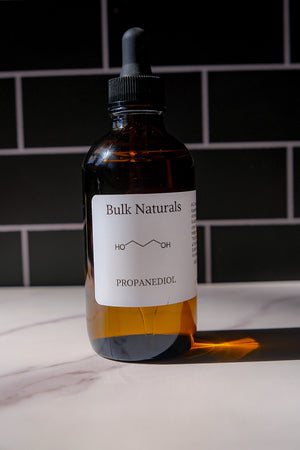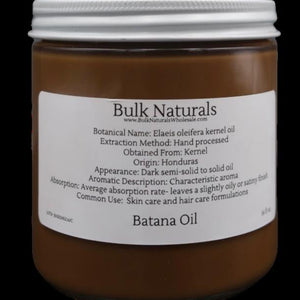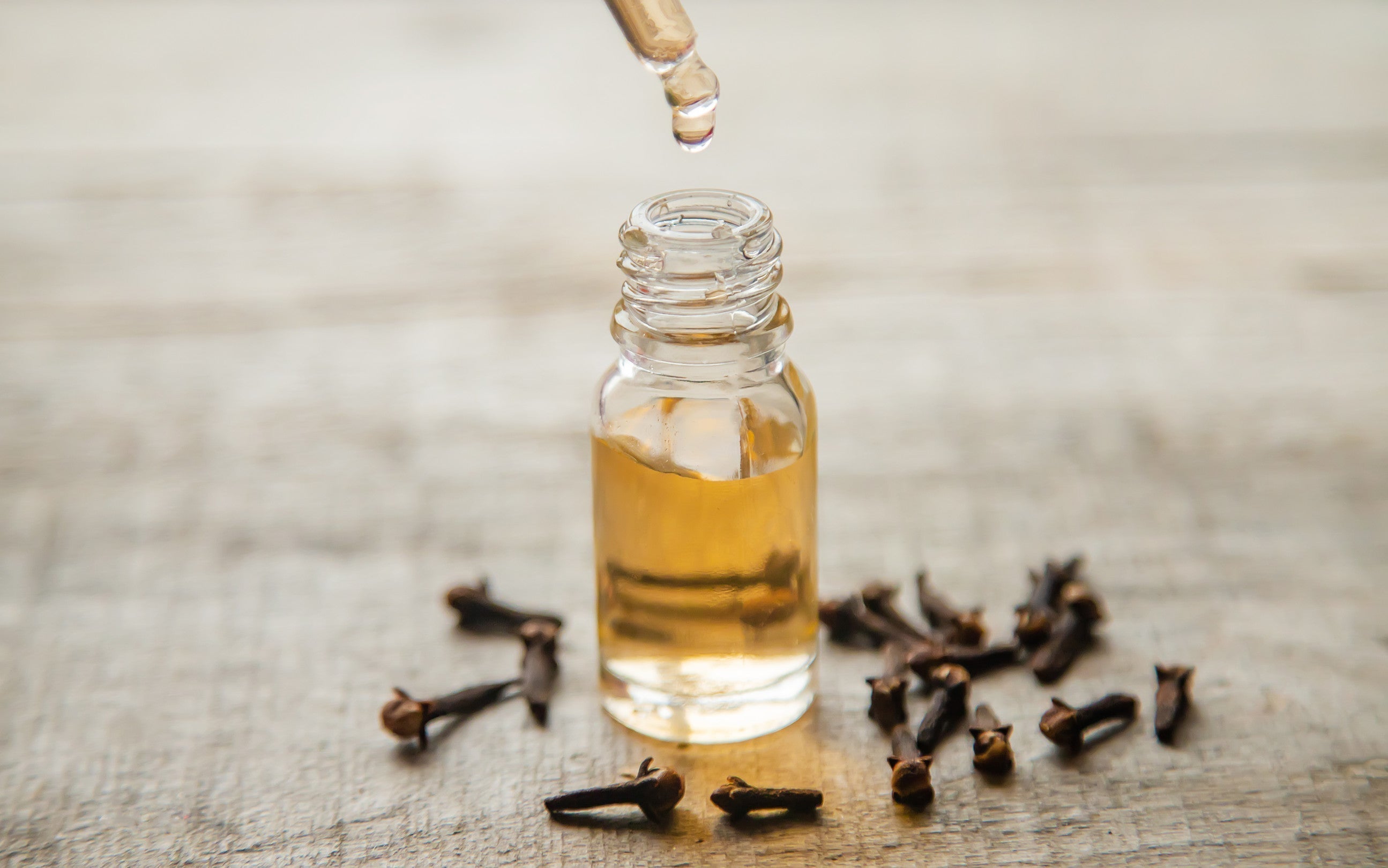When you think of clove, you might picture cozy fall desserts, warm mulled cider, or the comforting aroma of spiced chai. But beyond its culinary charm, clove holds a surprisingly powerful secret for your skincare routine.
Clove Bud Essential Oil (Eugenia caryophyllata/Syzygium aromaticum) is rapidly gaining recognition in natural skincare circles—not just for its bold aroma, but for its potent functional benefits. With a long history in herbal medicine and aromatherapy, this essential oil is prized for its antimicrobial, anti-inflammatory, analgesic, and antioxidant properties.
What makes it stand out? It’s all about the chemistry.
Steam-distilled from the unopened flower buds of the clove tree, the oil is naturally rich in eugenol—a phenolic compound that gives clove its characteristic spicy scent and therapeutic power. Eugenol accounts for up to 90% of the oil’s content and has been studied extensively for its ability to fight bacteria, reduce oxidative stress, and calm irritated skin.
Combined with other minor constituents like caryophyllene (anti-inflammatory) and vanillin (which adds a hint of sweetness to its aroma), Clove Bud Essential Oil offers a well-rounded botanical profile ideal for targeted, results-driven skincare formulations.
From clarifying spot treatments to invigorating massage blends and blemish-fighting balms, clove bud oil can bring bold benefits in small doses—especially when paired with complementary oils or soothing actives.
Did you know? In traditional medicine, clove has been used not only for its pain-relieving effects (especially in dentistry), but also as a natural remedy for skin infections and inflammatory conditions.
Whether you're blending for blemish control, barrier support, or an invigorating body oil, Clove Bud Essential Oil from Bulk Naturals Wholesale brings heat and healing in a single drop.
1. What Makes Clove Bud Essential Oil Special?
Clove bud essential oil, distilled from the unopened flower buds of the Syzygium aromaticum (or Eugenia caryophyllus) tree, is a powerhouse ingredient with a long history in traditional medicine—and a growing reputation in modern skincare. What sets this oil apart is its exceptionally high content of eugenol (typically 75–90%), a potent phenolic compound with wide-ranging therapeutic effects.
While many essential oils offer fragrance or mild antimicrobial action, clove bud oil delivers a rare trifecta of antioxidant protection, antimicrobial potency, and localized soothing effects—all in a single drop. This makes it uniquely suited for spot treatments, acne formulations, clarifying balms, and even targeted massage oils for congested skin.
Primary Active Components:
-
Eugenol – The dominant compound, known for its broad-spectrum antimicrobial, antifungal, and analgesic (pain-relieving) properties. It actively neutralizes free radicals, helps reduce breakouts, and soothes inflamed or irritated skin.
-
β-Caryophyllene – A lesser-known terpene with anti-inflammatory and calming properties. It helps reduce redness, reactivity, and skin discomfort when used in appropriate dilution levels.
-
Vanillin & Trace Esters – These minor compounds lend a subtle sweetness and softness to the oil’s otherwise spicy profile, adding depth to blends and formulations.
Clove bud essential oil is typically extracted via steam distillation, a gentle method that preserves the integrity of its volatile compounds without relying on harsh solvents. The result is a pale to golden yellow oil with powerful activity and a characteristically warm, spicy scent that blends well with citrus, florals, and resins.
Key Features & Formulation Benefits:
-
✅ High eugenol content makes it extremely effective in low concentrations (typically 0.5–1%)
-
✅ Steam-distilled to preserve delicate aromatics and bioactives
-
✅ Warm, earthy aroma adds richness to aromatherapeutic or natural perfumery blends
-
✅ Versatile in formulation — works in balms, oils, masks, and cleansing bases
-
✅ Compatible with clarifying, antibacterial, and circulation-boosting formulations
Did You Know?
Eugenol is still widely used in dentistry for its numbing and antiseptic effects, especially in temporary fillings and oral rinses. Its fast-acting ability to calm inflammation and kill bacteria translates beautifully to topical skincare—especially for blemishes, bites, and small cuts.
2. Skin Benefits of Clove Bud Essential Oil
Clove bud essential oil offers an impressive range of skin benefits due to its high concentration of bioactive compounds, especially eugenol and β-caryophyllene. Its versatility makes it a go-to ingredient for brands focused on targeted, minimalist, and natural skincare—particularly for acne-prone, inflamed, or congested complexions.
Antimicrobial & Anti-Acne Action
Clove bud oil has been extensively studied for its potent antimicrobial effects, particularly against acne-related pathogens like Staphylococcus aureus, Propionibacterium acnes (now Cutibacterium acnes), and even certain strains of Candida and E. coli.
In topical skincare, this translates into a natural yet powerful option for:
-
Spot treatments for active blemishes or whiteheads
-
Clarifying masks or cleansers for oily, congested skin
-
Serums and toners designed to reduce breakout frequency and skin imbalance
Unlike synthetic antibacterial agents that may strip or sensitize the skin, clove oil works synergistically with the skin’s natural defenses. When properly diluted (≤1%), it helps reduce microbial overgrowth without compromising the barrier.
Anti-Inflammatory Relief
Eugenol and caryophyllene are both known for their anti-inflammatory effects, making clove bud oil especially useful in products aimed at calming irritation. These compounds help interrupt the inflammatory cascade that can lead to:
-
Redness and swelling during breakouts
-
Post-inflammatory hyperpigmentation (PIH) from acne or insect bites
-
Minor allergic reactions or itchiness due to environmental stressors
This makes clove oil a great ingredient in post-cleansing serums, after-sun balms, and redness-reducing spot products—especially when paired with calming allies like chamomile, lavender, or aloe vera.
Stimulates Microcirculation
One of the most unique features of clove oil is its ability to create a warming, tingling effect on the skin. This sensation isn't just superficial—it’s the result of increased local blood flow and oxygenation, which can temporarily improve tone and promote a natural flush.
This effect may:
-
Enhance the appearance of dull or uneven skin
-
Support detoxification and lymphatic movement in facial massage oils
-
Improve nutrient delivery in masks or body scrubs
It’s particularly beneficial in winter skincare, body oils, or treatments for sluggish, sallow, or mature skin.
Wound Healing & Scar Support
Thanks to its combination of antimicrobial, antioxidant, and circulatory benefits, clove oil may play a supporting role in skin regeneration. While it’s not a primary wound-healing agent, it can be incorporated into products designed to:
-
Minimize post-acne scarring and dark marks
-
Accelerate the healing process of small blemishes or abrasions
-
Improve skin texture by stimulating collagen and tissue repair at a cellular level
Used correctly, it complements Vitamin E, tamanu oil, or centella asiatica in post-blemish care routines or barrier-rebuilding formulas.
Pro Tip for Formulators: To enhance anti-acne benefits, pair clove oil with niacinamide, willow bark extract, or green tea extract. For circulation and glow, try combining with Ginger, Turmeric Root, or Cinnamon Leaf—in safe, well-diluted amounts.
3. Caveats & Safety Guidelines
While Clove Bud Essential Oil has numerous skincare benefits, it’s also one of the most potent essential oils available. Its high eugenol content demands cautious handling to avoid irritation, sensitization, or adverse reactions.
⚠️ Use Dilution Guidelines
Clove oil should always be diluted before applying to the skin. Recommended topical dilution rates are:
-
0.25% to 0.5% for leave-on face products
-
Up to 1% for body care or wash-off formulations
-
Never use undiluted directly on skin — it can cause burning, stinging, or prolonged irritation.
Patch Testing is Essential
Before adding to a formulation or applying to larger areas of skin, always perform a 24–48 hour patch test on a small, discreet area.
-
Watch for redness, itching, or sensitivity.
-
Consider recommending this step to your customers on product labels or instructions.
Use with Caution on Sensitive Groups
Due to its potency, Clove Bud Essential Oil is not recommended for:
-
Pregnant or breastfeeding individuals
-
Children under age 5
-
Those with bleeding disorders, anticoagulant medications, or highly reactive skin
Allergen Awareness
Eugenol is a known skin sensitizer. It’s listed as a potential allergen in many clean beauty regulations, including EU cosmetic law. While safe when used appropriately, formulators should:
-
Clearly label its inclusion on INCI lists
-
Avoid pairing it with other strong sensitizers in one product
-
Consider using in rinse-off or spot-treatment applications rather than full-face leave-on formulas for sensitive skin
Regulatory Tip: In the EU and many international regions, eugenol must be listed separately on cosmetic labels if used above 0.001% in leave-on products or 0.01% in rinse-off products.
4. Smart Formulation Tips
Clove Bud Essential Oil is a versatile ingredient when used mindfully. Its warmth, strength, and complexity can enhance both the function and sensory experience of your products.
Suggested Use Levels
-
Facial serums or spot treatments: 0.25–0.5%
-
Body balms or massage oils: 0.5–1%
-
Cleansers, masks, or scrubs: up to 1%
-
Always use a digital scale for accurate measurement at these low levels.
Product Types It Works Well In
Clove oil performs best in formulas designed for short-term application, targeted delivery, or where circulation-boosting is beneficial. Great examples include:
-
Blemish balm sticks or roller spot serums
-
Massage oils or warming body butters
-
Clay or charcoal masks for congested skin
-
Clarifying oil cleansers with other essential oils
Ideal Pairings for Skin Synergy
Clove oil plays well with a number of calming, grounding, and clarifying ingredients:
| Category | Ingredients | Why It Works |
|---|---|---|
| Carrier Oils | Jojoba, Squalane, Moringa, Tamanu | Dilute eugenol and support skin recovery |
| Essential Oils | Lavender, Frankincense, Geranium | Balance clove’s intensity with calming florals |
| Actives | Willow Bark, Niacinamide, Green Tea | Target blemishes and reduce PIH |
| Botanicals | Calendula, Chamomile, Marshmallow Root | Enhance barrier soothing for balanced formulas |
Sensory Formulation Considerations
-
Aroma: Bold and spicy—adds warmth and depth to earthy or herbal blends
-
Color: Typically pale yellow, minimal visual impact
-
Texture: Easily disperses in oil phases, balms, or masks
-
Feel: Can cause a mild warming/tingling sensation; avoid mucous membranes
Pro Formulator Tip: To reduce intensity while preserving benefits, use clove oil in combination with CO₂ extracts or hydrosols of calming botanicals. You’ll create a more skin-friendly balance without losing performance.
5. DIY Recipe: Clarifying Clove & Honey Spot Balm
This small-batch balm soothes active breakouts while offering antibacterial and healing support.
Ingredients (15g batch):
-
7g Beeswax
-
0.15g Clove Bud Essential Oil (1%)
Instructions:
-
Gently melt beeswax and coconut oil in a double boiler.
-
Remove from heat and stir in honey and essential oils.
-
Pour into a sanitized 15ml balm tin.
-
Let cool and solidify. Apply to clean, affected areas as needed.
Note: Always perform a patch test before use, especially if you have sensitive skin.
6. Who Should Use Clove Bud Essential Oil?
Clove Bud Essential Oil is a powerful botanical with targeted benefits—but like all potent ingredients, it’s not one-size-fits-all. When used thoughtfully, it can be an excellent addition to a focused skincare regimen, especially for those dealing with breakouts, sluggish circulation, or the occasional flare-up.
Best Suited For:
Acne-Prone Skin
Thanks to its high eugenol content, clove oil provides strong antimicrobial action, particularly against Propionibacterium acnes and Staphylococcus aureus—two common acne-related bacteria. It also helps soothe inflammation, reduce redness, and support quicker blemish healing when used in diluted spot treatments or purifying blends.
Oily or Congested Skin
Clove oil is ideal in formulations for oily skin types due to its pore-purifying and astringent properties. It can assist in reducing sebum buildup, clearing congestion, and minimizing the appearance of enlarged pores. Combined with balancing botanicals like Witch Hazel or green tea, it can offer a natural alternative to harsher clarifiers.
After-Sun Skin Recovery
Mild sun exposure or irritation can benefit from clove’s anti-inflammatory effects, which help reduce the look of post-sun redness or uneven tone. When paired with aloe, calendula, or Panthenol, it can support the recovery of heat-stressed skin in balms, body oils, or masks.
Massage and Body Care
Clove oil’s warming, circulation-boosting effect makes it popular in aromatherapy and massage formulas. When diluted into a carrier like jojoba or Sweet Almond Oil, it can help stimulate blood flow, ease muscular tension, and leave skin feeling refreshed and energized.
⚠️ Not Recommended For:
Ultra-Sensitive or Reactive Skin
Clove Bud Oil may be too strong for those with compromised barriers, eczema, rosacea, or frequent irritation. The eugenol can trigger redness or burning, especially in thin-skinned areas. Opt for gentler essential oils like Blue Tansy or lavender instead.
Eye and Lip Areas
Avoid use near the eyes, lips, nostrils, or any mucous membranes, as even trace amounts of undiluted oil can cause stinging, tearing, or burning. Formulations intended for these areas should be eugenol-free.
Pediatric Skincare
Due to its strength and potential sensitization risk, clove oil is not recommended for children under 5. The skin of infants and toddlers is much more permeable, increasing the chance of irritation or allergic response.
Pro Tip: If you're formulating for more sensitive users or first-time natural skincare adopters, consider offering a "clarifying blend" with lower clove concentrations (≤0.25%) alongside soothing oils like calendula, chamomile, or oat extract to balance its potency.
7. FAQs — What You Should Know Before Using Clove Bud Essential Oil
Q: Can I use Clove Bud Oil every day?
A: Yes—but only in low, well-diluted concentrations (typically 0.25–0.5% for face, up to 1% for body). Because it’s a highly active essential oil with eugenol, overuse can lead to sensitization or barrier disruption over time. Always monitor your skin’s response, and consider using it in targeted or rotational applications instead of daily full-face use.
A: Yes—but only in low, well-diluted concentrations (typically 0.25–0.5% for face, up to 1% for body). Because it’s a highly active essential oil with eugenol, overuse can lead to sensitization or barrier disruption over time. Always monitor your skin’s response, and consider using it in targeted or rotational applications instead of daily full-face use.
Q: Will it stain the skin?
A: No, Clove Bud Essential Oil doesn’t leave behind any permanent staining. However, its warming effect may cause temporary redness or a flush—especially in sensitive skin—due to increased blood flow at the surface. This is a natural response and typically fades within minutes.
Q: Can I use Clove Oil in lip balms or care products?
A: Not recommended. While the spicy tingle might seem appealing in theory, clove oil can be irritating to the delicate lip area and mucous membranes. It’s best avoided in lip, eye, or nose-adjacent formulas unless working with extremely low dilutions and under expert guidance.
Q: Is Clove Bud Essential Oil safe for ingestion?
A: No—BNW’s Clove Bud Oil is for external, topical use only. While clove oil is sometimes used internally in herbal medicine, doing so requires strict dosage control and medical supervision. Ingesting essential oils without guidance can be dangerous. Always consult a qualified healthcare provider before considering internal use.
Q: Can I blend clove with other essential oils?
A: Absolutely. Clove pairs beautifully with calming oils like Lavender, Frankincense, Geranium, and Orange. These not only temper clove’s intensity but also offer synergistic effects for skin and aroma. Just remember to keep the total essential oil concentration within safe dermal limits.
Q: How long does clove oil stay effective in a product?
A: Clove Bud Oil is relatively shelf-stable when stored properly. To maintain freshness:
-
Keep tightly sealed in a dark glass bottle
-
Store in a cool, dry place
-
Avoid exposure to light, air, or heat
With good storage, clove oil can remain effective for 1–2 years.
Final Thoughts: Small Drop, Big Power
Clove Bud Essential Oil is bold, botanical, and incredibly versatile. With just a few drops, it can transform skincare products with its natural purifying power, circulation-boosting warmth, and rich, spicy scent. It’s not for every skin type—but for acne-prone, oily, or resilient complexions, it can be a game-changing ingredient when used with care.
Whether you're formulating a clarifying balm, a warming body oil, or a blemish-targeted spot treatment, this essential oil brings functional performance and aromatic elegance to your formulations.
Ready to explore this aromatic powerhouse?
Further Reading & Research
1. Nisar, M. F., Khadim, M., Rafiq, M., Chen, J., Yang, Y., & Wan, C. C. (2021). Pharmacological properties and health benefits of eugenol: A comprehensive review. Oxidative Medicine and Cellular Longevity, 2021, 2497354. https://doi.org/10.1155/2021/2497354
2. Pandey, V. K., Srivastava, S., Ashish, Dash, K. K., Singh, R., Dar, A. H., Singh, T., Farooqui, A., Shaikh, A. M., & Kovacs, B. (2023). Bioactive properties of clove (Syzygium aromaticum) essential oil nanoemulsion: A comprehensive review. Heliyon, 10(1), e22437. https://doi.org/10.1016/j.heliyon.2023.e22437







Leave a comment